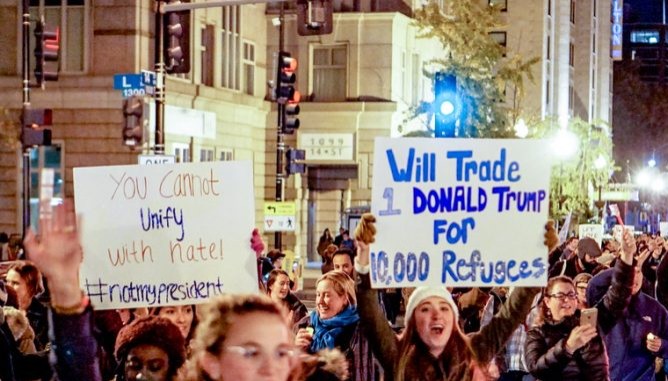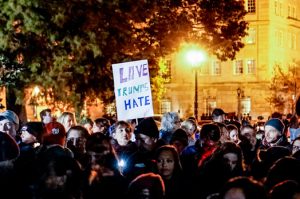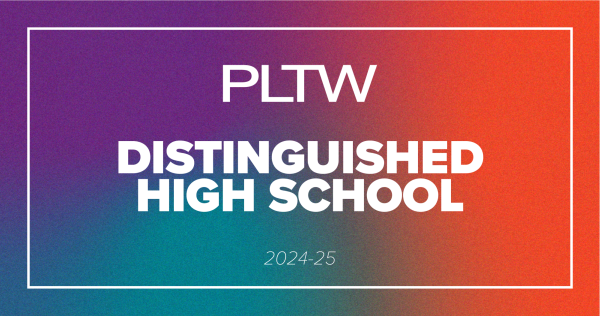Generations watch on as Trump becomes the first president to face impeachment trials twice
Anti-Trump protests have occurred across the country since before Trump’s presidency in 2016. These sentiments seem to have fueled subsequent impeachment trials.
Note: Students who believed it was unfair to call an impeachment for Trump were also interviewed for this article, but as a result of their preference for anonymity, their responses could not be shared.
Former President Donald Trump faced his second impeachment trial this February. The House of Representatives voted to impeach him on Jan. 13, 2021, just one week before President Joe Biden’s inauguration. While further legal proceedings remained in the hands of the Senate, this event marked the first time a federal office holder has been voted to be impeached twice by the House.
According to the Constitution of the United States, after the House votes to impeach an office holder, the Senate proceeds to decide whether or not the accused is guilty of the crimes cited in the articles of impeachment. A majority vote of two thirds of all senators (67 votes) is required to convict the defendant. If convicted, the impeached official is removed from office and can also be prevented from holding office in the future.
This trial specifically focused on whether or not Trump incited the insurrection at the Capitol building on Jan. 6, 2021. There have only been seven previous attacks on the Capitol building: the burning of the Capitol during the War of 1812, violence between members of the House of Representatives in 1858 and five other shootings and bombings that occured between 1915 and 1998. The 2021 storming of the Capitol was fueled by sentiments of a fraudulent election, and many argued that Trump encouraged his supporters to participate in the act.
In response, the cases of nine impeachment managers (people attempting to convince senators to convict Trump) and Trump’s defense team were equally presented to the Senate, before each senator cast their vote. Final votes on the impeachment article showed that 57 senators voted that Trump was guilty, while 43 believed he was innocent. Trump was thus acquitted by the Senate on Feb. 13, 2021.
There have been many divisions pertaining to the decision made by the Senate, which many have attributed to their unsettlement with the current political climate in the United States. Such sentiments have brought their way to Neuqua Valley High School, where students have expressed that they feel clouded by political pressure.
Shandana Malik, a sophomore at Neuqua Valley, has grown desensitized to modern politics, describing how the unfolding events “if anything, [have] made [her] more aware of how numb [she’s] gotten to how chaotic this country actually is.”
Malik feels frightened acknowledging that she feels this way because she believes that an impeachment occurring is incredibly abnormal and that she should be surprised, rather than unphased by its occurence. However, she simultaneously believes that the impeachment process could serve as hope for the future.
“It goes to show just how poor the circumstances truly were for it to reach [this] point. A lot of changes need to be made but specifically, the fact that this was a bipartisan impeachment, shows that both Democrats and Republicans can… come together when they prioritize the country and the actual people, not personal interest.”
Junior Rishika Gaddamanagu expanded upon this sentiment, saying she thinks that “a lot of us began to lose hope in the American values of liberty, equality and fraternity. I hope we can learn to restore some faith in the country’s constitutional process, and that no one can ever take those values from us.”
The idea of upholding American values remains mostly everpresent in today’s political climate, regardless of party affiliation. There are consequently many courses of action that can be taken to support these principles. For example, while some believe that an impeachment was a good call for the United States, others are not supportive of the House’s vote.
Conversations regarding these varying perspectives have made their way into the classroom through open discussions that provide students with a respectful and safe environment to share their voice.
Gaddamanagu referenced how her AP United States History class had an open discussion regarding the Capitol riots and how many people were comparing them to the Black Lives Matter movement.
From her perspective, “the Black Lives Matter movement has always been represented as an ongoing, uphill battle against the deep rotted [sic] systemic racism that Black people face in this country, while the storming of the Capitol was a domestic terrorist attack with a goal to do just that: incite terror and violence. Some members involved in the open discussion were finding it hard to distinguish the values of either movement, and it disgusted [her].”
Students are all entitled to their own political opinion, and conversations with their peers are just one of many ways that they can express their views. The goal of conveying these feelings in a classroom environment is not to cause tensions between peers but rather bring light to other people’s beliefs.
Social Studies teacher Joseph Polanski believes that exposing students to opposing views is an important step in the education of students. He hopes that with everyone’s awareness of the political climate of the United States, students will explore their surroundings and think critically based on facts and evidence.
“I think that the election and ensuing months of questioning its integrity have raised everyone’s awareness of how the elections work and the vision of the drafters of the Constitution. It seems that the violence and the hatred on recent display has led to a stronger feeling of patriotism, pride in, and appreciation for our democracy, which we had previously taken for granted… I hope that [students] learn to have difficult conversations to help bring Americans together in the future.”
Your donation will support the student journalists of Neuqua Valley High School. Your contribution will allow us to print our next newspaper edition as well as help us purchase equipment and cover our annual website hosting costs.







